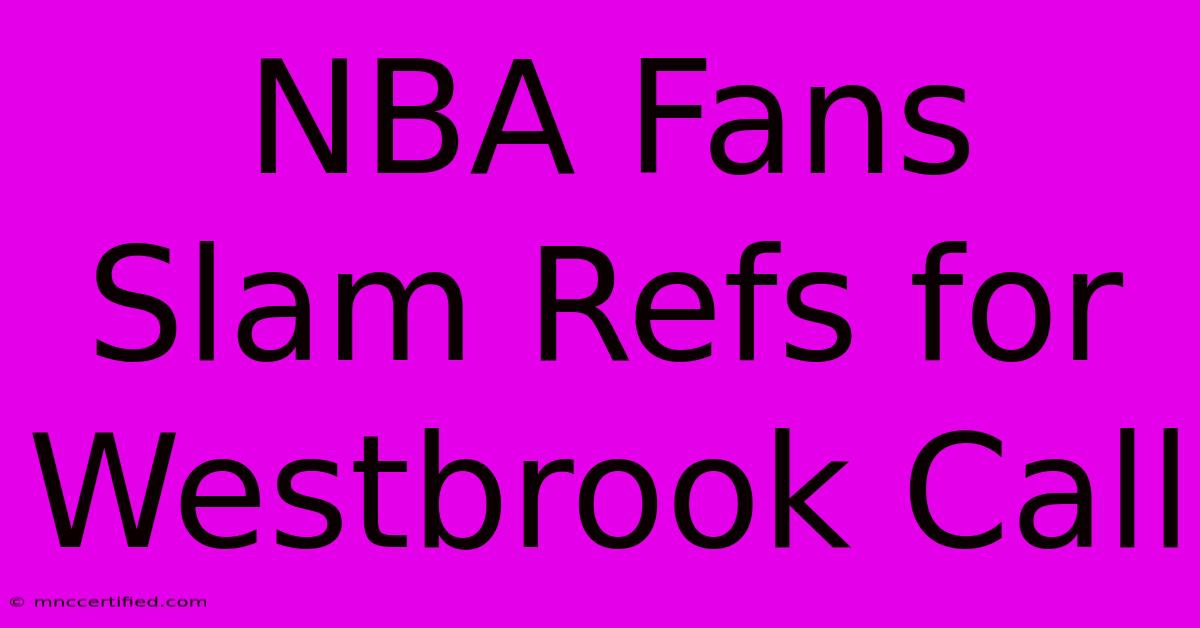NBA Fans Slam Refs For Westbrook Call

Table of Contents
NBA Fans Slam Refs for Controversial Westbrook Call: A Breakdown of the Outrage
The internet erupted after a questionable officiating call involving Russell Westbrook during a recent NBA game. Fans, analysts, and even some players voiced their strong disapproval, sparking a widespread debate about referee consistency and the impact of crucial calls on game outcomes. This article delves into the specifics of the controversial call, examines the subsequent fan reaction, and explores the broader implications for the NBA.
The Play That Ignited the Firestorm
The controversial play involved [insert specific details of the play here, including the game, the opposing player, the time in the game, and the exact nature of the call. Be specific! e.g., "a late-game possession against the Boston Celtics where Westbrook appeared to draw a foul on Jayson Tatum, but the referees did not call it."]. Many argued that the non-call was a blatant missed foul, potentially altering the game's momentum and outcome. Videos of the play quickly went viral, highlighting the seemingly clear contact and the subsequent lack of a whistle. This lack of a call, perceived as unfair by many Westbrook and Thunder fans, created the perfect storm for widespread online criticism.
The Visual Evidence: Slow-Motion and Multiple Angles
The visual evidence, widely circulated across social media, showed [Detailed description of the visual evidence. Use precise language and emphasize details that support the claim of a missed call. E.g., "slow-motion replays clearly depicted Westbrook's arm being held by Tatum, impeding his shot attempt."]. This allowed fans to scrutinize the play frame by frame, further fueling their anger and solidifying their belief that the referees made a significant error. The availability of multiple camera angles, showing the play from various perspectives, only intensified the debate.
The Social Media Outrage: #NBAScams and Beyond
The reaction on social media was immediate and intense. Hashtags such as #NBAScams, #RefShow, and #WestbrookRobbery trended on Twitter and other platforms. Fans expressed their frustration through a barrage of tweets, comments, and memes, many accusing the league of bias or incompetence in officiating. The sheer volume of negative feedback highlighted the intensity of fan sentiment and the significant impact of perceived officiating errors on viewer experience.
Beyond Tweets: Forums and Online Communities
The controversy extended beyond Twitter. Dedicated NBA forums and online communities buzzed with discussions analyzing the call, debating its legitimacy, and questioning the overall consistency of NBA officiating. These discussions provided a platform for deeper analysis and further fueled the outrage. This sustained online engagement underscores the long-term impact of such incidents on the NBA's public image.
The Broader Implications: Referee Accountability and Fan Trust
This incident raises important questions about referee accountability and the maintenance of fan trust in the NBA. While human error is inevitable in officiating, the frequency of controversial calls can erode viewer confidence and lead to a decline in fan engagement. The NBA needs to address these concerns proactively, perhaps through increased transparency in officiating reviews or improved communication with fans regarding controversial decisions.
Moving Forward: Improving Referee Training and Transparency
To mitigate future controversies, the NBA could explore several options. Improved referee training focused on consistent application of rules, the implementation of advanced technology like replay reviews for crucial calls, and increased transparency in explaining controversial decisions are crucial steps. Open communication and accountability can go a long way in fostering a more positive relationship between the league and its fanbase.
Conclusion: The Westbrook Call and the Future of NBA Officiating
The controversial non-call involving Russell Westbrook serves as a potent reminder of the crucial role officiating plays in shaping the NBA narrative. The intense fan reaction highlights the need for improved referee training, technological advancements in officiating review, and increased transparency in decision-making. Addressing these issues is not just about appeasing disgruntled fans, but about maintaining the integrity and credibility of the NBA game itself. The league needs to act decisively to restore faith and ensure fair play for all.

Thank you for visiting our website wich cover about NBA Fans Slam Refs For Westbrook Call. We hope the information provided has been useful to you. Feel free to contact us if you have any questions or need further assistance. See you next time and dont miss to bookmark.
Featured Posts
-
Dwac Stock Price Prediction 2030
Nov 21, 2024
-
Hired And Non Owned Auto Insurance
Nov 21, 2024
-
November 21 24 Racing On Tv
Nov 21, 2024
-
Rhinoplasty Covered By Insurance
Nov 21, 2024
-
Insurance Companies In Albany Ga
Nov 21, 2024